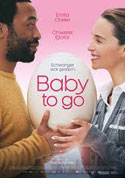

Opening 11 Jan 2024
Directed by:
Sophie Barthes
Writing credits:
Sophie Barthes
Principal actors:
Emilia Clarke, Chiwetel Ejiofor, Vinette Robinson, Veerle Dejaeger, Lamara Strijdhaftig
Artificial intelligence keeps taking charge, now even controlling the birth of babies. They are no longer carried in a mother’s womb. Now, the fertilized egg is placed in a plastic pod, set on a shelf in the Womb Center and opened nine months later to release a new- “born” baby. Rachel (Emilia Clark), who is already professionally connected with the technical world, decides that this is the way to go. Why suffer pregnancy and the pain of birth, while following a professional career, if there is another possibility? Her husband Alvy (Chiwetel Ejiofor), father of the “child,” is skeptical; he works in the botanical world, planting in the forest. He wants a “natural” child. At least it shouldn’t sit on a shelf. Papa picks up the pod and carries it around, as if he were pregnant.
The original title, The Pod Generation, will show under the title Baby to Go in Germany, although perhaps “Baby to Come” would be more logical. In the end, Rachel and Alvy take off to sit at the seaside of Shell Island, a “natural” environment for a birth. Perhaps they have reached a kind of compromise, after 110 minutes of arguing. And then there is the olive tree. Emilia Clarke and Chiwetel Ejiofor are excellent British actors, both born in London, both worth your time in the cinema, even though the film is a bit repetitious and could work just as well 30 minutes shorter. Baby to Go premiered at the 2023 Sundance Film Festival, where it won the Alfred P. Sloan Prize, awarded to films featuring science or technology. (Becky Tan)
French writer-director Sophie Barthes has crafted one of the most thoughtful and thought provoking, disturbingly so, twenty-first century dramas yet. Humans are becoming secondary to AI (artificial intelligence), allowing it to guide their decision-making lives, as well as dipping into their therapeutic selves from the moment they open their eyes, until sleep closes them at night.
Barthes sets up this dystopian world beautifully with a workforce reversal highlighted by the nontraditional couple: the corporate big-time earner is Rachel Novy (Emilia Clarke), and Alvy Novy (Chiwetel Ejiofor) is the stay-at-home botanist husband. Mornings, Rachel is comforted gazing down at the modern metropolis from their high-rise perch. She dreams of being a mother in combination with her corporation’s objective to influence environments into expanding and enhancing AI’s further development. In contrast Alvy strives to nurture and work with real nature, plus introducing his students to what nature is, its tactility; he stargazes at night for sport. When a spot opens at the Womb Center (W.C.), Rachel jumps at the opportunity, then talks to her AI therapist. She divulges to best friend Alice (Vinette Robinson) that Alvy is clueless their name is on W.C.’s list. Additionally, the human resources director (Aslin Farrell) says Pegazus will partially pay toward the pricey Pod birth. Rachel attends the W.C.’s introductory meeting and tour alone with its director Linda Wozcheck (Rosalie Craig).
Naturally Alvy is hurt, mad, and balks when he is finally told about the arrangements, but eventually capitulates for Rachel’s sake. Spending an evening with Alice and Ben (Jelle De Beule) for support, the conversation shift to vagina politics is a bit dicey. During the ensuing months, though, as their attitude toward and position on AI’s detachable pods and faux pregnancy shifts, Rachel senses what is really at stake, and they take charge of their future.
Clarke and Ejiofor’s emotional seesaw performances wrench audiences’ consciences only to be tugged back into perspective by Robinson and De Beule’s characters, supported by an admirable cast. Clement Price-Thomas’s production design with Stephan Rubens’s art direction and Marion Michel’s set direction creatively magnify the innovative, egalitarian lifestyle. Andrij Parekh’s cinematography with Olivier Bugge Coutté and Ron Patane’s editing skillfully emphasize Barthes’s acuity. Examples of ironies in Barthes’s screenplay is the young professional woman shopping for a baby in vis-à-vis a supermarket, and a scene emphasizing the marked difference in children’s education and technology between the American enamor and the European perspective.
The German title’s glibness, Baby to Go, makes light of the film’s mesmerizing, menacing futuristic quality. Its unprecedented sci-fi story dips into a not-so-distant future conceptualized with enough originality, moral questions, and dilemmas to hold one’s attention long after the film ends. (Marinell Haegelin)